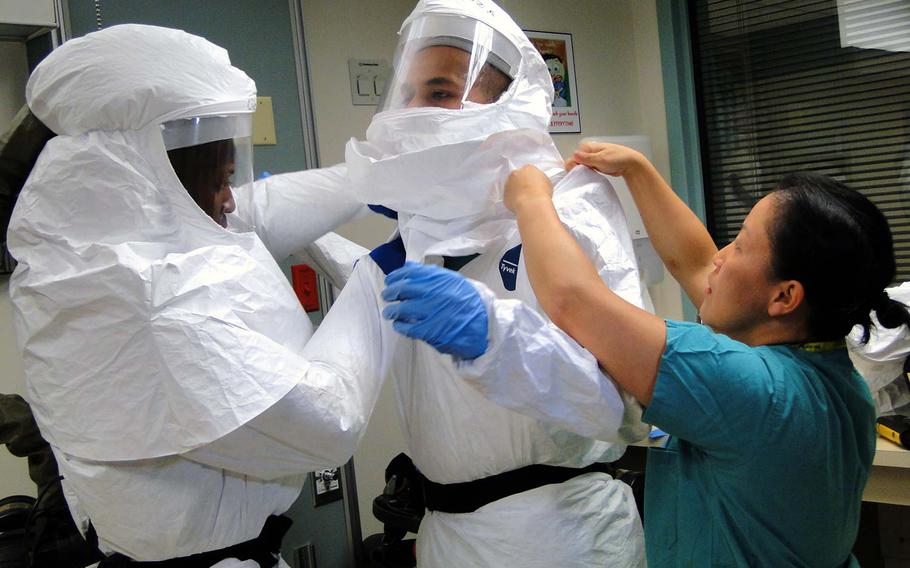
Members of the Defense Department's medical support team formed to assist civilian hospitals with Ebola patients, if needed, practice putting on and taking off protective suits Friday, Oct. 24, 2014, at San Antonio Military Medical Center in Texas. (Jennifer Hlad/Stars and Stripes)
SAN ANTONIO MILITARY MEDICAL CENTER, Texas – If a hospital in the United States needs help treating Ebola patients, a newly formed military medical team will be ready.
The head of the 30-member team said Friday he expects they’ll complete their training by Monday evening. The team has been tasked by Defense Secretary Chuck Hagel with deploying within 72 hours to help civilian medical staff treat the disease that’s infected 10,000 people — almost all of them in West Africa.
The group, made up of volunteers from the Army, Air Force and Navy, was notified Monday that they had been selected. About half are from the San Antonio area, while the others come from as far away as Hawaii and the East Coast. They reported Tuesday and began training Wednesday.
Many have done extensive work in infectious disease control and research, and one, Cmdr. James Lawler, treated patients with Ebola in Guinea. Lawler is an infectious disease physician at the Naval Medical Research Center in Silver Spring, Maryland.
“There’s not a lot of magic about delivering this care to these patients,” Lawler said Friday in a press conference. “It’s just doing the basics well. But that can be a challenge in and of itself, with the type of disease we’re dealing with.”
Ebola has no vaccine, said Col. John DeGoes, command surgeon for U.S. Northern Command. “Proficiency with [personal protective equipment] could be the difference between infection or not, which has significant consequences.”
And caring for patients with Ebola is very labor-intensive, Lawler said, which makes it easy to lose focus after hours of stressful work in an isolation facility.
“I think the most important thing to remember is just to be deliberate,” he said.
On Thursday, a New York City doctor who returned from treating Ebola patients in Guinea a week ago was diagnosed with the disease. Dr. Sonja Rasmussen, acting director of the Office of Public Health Preparedness and Response at the Centers for Disease Control and Prevention said Friday afternoon that it is too early to know exactly how Dr. Craig Spencer contracted the disease.
> But, she said, while Ebola “sounds scary,” she said an outbreak in the United States is extremely unlikely and the government is doing all it can to keep the disease from spreading.
The CDC has “one, overriding priority: to keep Americans safe,” she said.
Ebola is spread through bodily fluids, and the doctors and nurses who treat infected patients must wear protective suits.
Because of the vigilance required, putting on or taking off the suit takes a good 15 minutes, said Army Maj. Rachel Park, the chief of critical care nursing at Martin Army Community Hospital at Fort Benning, Georgia.
Team members first disinfect the door handle and wash their hands while singing “Happy Birthday” twice, then cautiously remove the suit and gowns so that no clean hands or fabrics ever touch dirty fabrics or gloves. They must also be sure to roll their gloves off slowly to prevent fluid spatter, Park said.
“We’re not in the business of rushing anything,” she said.
The training “is relevant and realistic and will prepare them for any contingency, should we be asked,” DeGoes said.
Once the team finishes training, the members will return to their home stations, but be ready to deploy within 72 hours — and preferably much faster, DeGoes said — when requested by the Department of Health and Human Services.
The mission would be what is called “defense support to civil authorities,” and could be a request to relieve a civilian medical team, join civilian health care workers in treating patients, or even to split into two groups to respond to multiple crises, DeGoes said, and the training is designed so they will be ready to do whatever is asked of them.
Still, he said he does not believe their deployment is inevitable.
Rasmussen said New York seems well prepared to handle the new case, and there have been “early signs of success” and steady progress in Africa.
“The Department of Defense has made significant headway, but we have a long way to go,” she said.
Most of the Ebola patients who have been treated in the U.S. are health care workers infected while caring for the sick in West Africa, and the doctors and nurses who spoke to reporters Friday said they understand the dangers involved when they volunteered for the team.
Air Force Col. Brad Lloyd, the senior medical officer and team leader, said the military and medical professions both come with a degree of risk, but he is “very confident in the training we’re receiving.”
DeGoes said the group offered to host a town hall meeting for concerned family members, but only one person raised her hand. He said he wasn’t sure if the meeting was held or not, but said he has 16-year-old triplets at home, and “they’re not too concerned about it.”
Army Lt. Col. Steven Knapp, a public health nurse who specializes in disease control, said it is an honor to serve on the team and that the members, who all volunteered, are “proud and willing to do the work.”
Army Capt. Charlotte Nelson, a critical care nurse from San Antonio Military Medical Center, said she thought the team sounded like a great opportunity to serve. Her family understands the risk, she said, but the training is extensive, going beyond what is required by the CDC.
hlad.jennifer@stripes.com Twitter: @jhlad